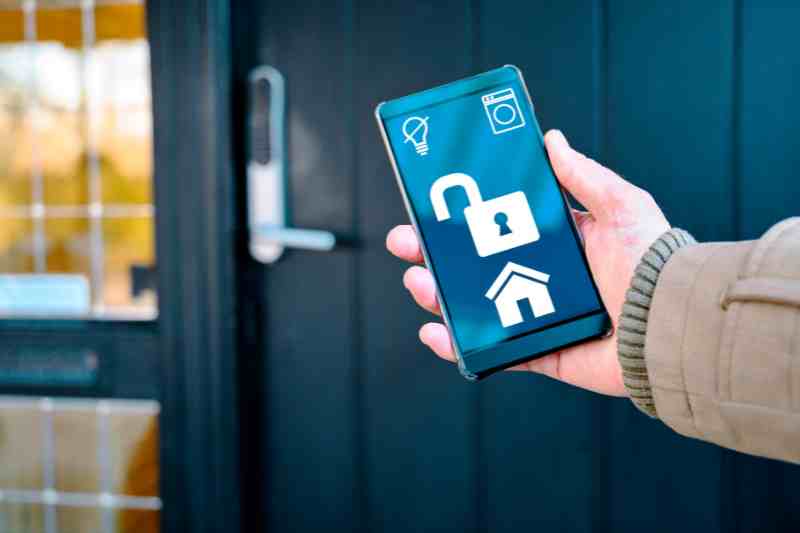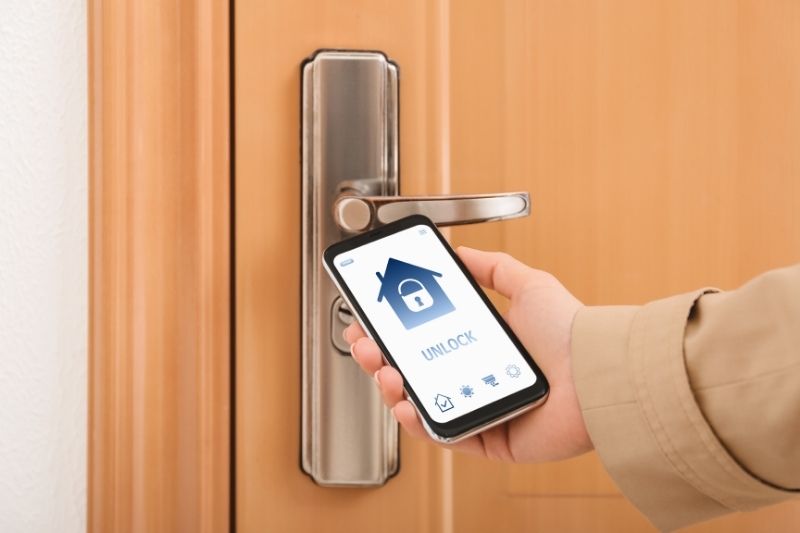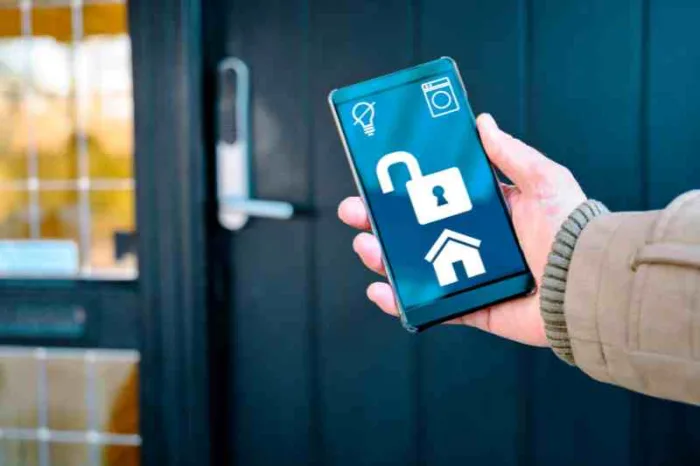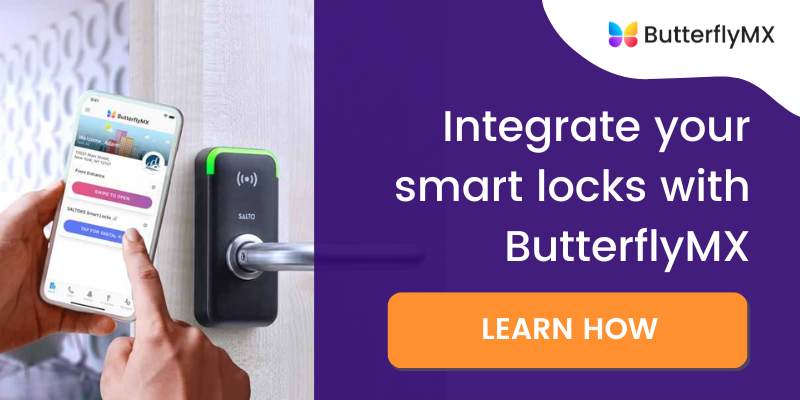Key takeaways
- The five best Bluetooth lock products are the Eufy Smart Lock Touch, Lockly Flex Touch Fingerprint Deadbolt, Wyze Lock Bolt, Yale Assure Lock SL, and Kwikset Aura 942 BLE Door Lock.
- A Bluetooth door lock uses hands-free technology to detect whether an unlocking credential is nearby.
- If you’re looking for a complete solution for all of your keyless entry needs, consider integrating your smart lock with a robust access control system

In an increasingly digital age, more and more buildings are relying on smart locks to help streamline building operations. Smart technology offers property managers and business owners flexibility and security — all while making access convenient. From multifamily buildings to commercial offices, a Bluetooth lock is a popular choice for keyless entry.
For that reason, you’ll find the five best locks on the market listed below. Additionally, you’ll discover how these types of locks differ from Z-wave and WiFi locks.
In this post, we cover:
- 5 best Bluetooth locks
- What is a Bluetooth lock?
- Bluetooth locks vs. Z-wave locks vs. WiFi locks
- Pros and cons of locks powered by Bluetooth
- Integrate your Bluetooth lock for a better access control solution
- Bluetooth lock FAQs
5 best Bluetooth locks
Finding the best Bluetooth lock for your building is crucial, but how do you decide which one to choose with so many options on the market?
Here’s our round-up of the best locks powered by Bluetooth:
- Eufy Smart Lock Touch
- Lockly Flex Touch Fingerprint Deadbolt
- Wyze Lock Bolt
- Yale Assure Lock SL
- Kwikset Aura 942 BLE Door Lock
1. Eufy Smart Lock Touch
Google rating: 5/5
Pros:
- Four ways to unlock
- IP65 weatherproof rating
- Auto-locking capabilities
- Reads fingerprints within 0.3 seconds
Cons:
- Limited integrations
- Pricey at $169.99
- Only compatible with lever-door handles
Read the full Eufy Smart Lock Touch review »
2. Lockly Flex Touch Fingerprint Deadbolt
Google rating: 4/5
Pros:
- Easy DIY installation
- State-of-the-art fingerprint sensor
- Stores up to 99 prints
- Auto-locking feature
Cons:
- Pricey at $189.99
- Requires hub for WiFi connection
- Limited integrations
Read the full Lockly smart lock review »
3. Wyze Lock Bolt
Google rating: 4/5
Pros:
- Affordable at $73.99
- Up to 1-year battery life
- 0.5-second fingerprint recognition
- Backlit keypad
Cons:
- No voice control
- Lacks integrations
Read the full Wyze smart lock review »
4. Yale Assure Lock SL
Google rating: 4/5
Pros:
- Compatible with voice assistants like Alexa, Google, and Siri
- Share unique entry codes with guests
Cons:
- Pricey at $309.99
Read the full Yale Assure smart lock review »
5. Kwikset Aura 942 BLE Door Lock
Google rating: 4/5
Pros:
- Up to 250 user codes
- Monitor usage with mobile app
- 100ft Bluetooth range
- Affordable at $120.50
Cons:
- No voice control
Read the full Kwikset smart lock review »
What is a Bluetooth lock?
A Bluetooth lock uses hands-free technology to detect whether an unlocking credential — like a key fob, smartphone, or other smart device — is nearby. The lock then authorizes this credential to grant automatic entry.
What’s more, a smart lock with a Bluetooth app allows you to send visitors and service providers digital keys so that they can securely access your building.
Bluetooth locks vs. Z-wave locks vs. WiFi locks
There are plenty of smart locks with wireless capabilities to choose from, so it’s important to consider your options to make the best choice for your building.
Let’s assess the differences between Bluetooth, Z-Wave, and WiFi locks:
Pros and cons of locks powered by Bluetooth
Wondering if a Bluetooth door lock system is right for your building? Consider the pros and cons first.
Pros:
- Convenient. A lock with Bluetooth can be used at any entrance in your building. Additionally, a Bluetooth gate lock can easily automate access to the gates at your property.
- Easy to use. These locks open automatically as soon as your fob, smartphone, or other Bluetooth-enabled device is within range.
- Battery powered. Most Bluetooth door locks are battery powered so you don’t have to worry about them not working during power outages.
- No internet connection is required. Locks with Bluetooth don’t require an internet connection, so you won’t need to set up a wireless gateway or maintain a reliable WiFi network.
Cons:
- Can’t be controlled remotely. Bluetooth door locks only work if your credential is within range of the lock.
- Pricey. Most locks cost between $100-$300 per lock.
- Bluetooth can drain your battery. Having Bluetooth activated on your smartphone or smart device for extended periods of time can drain your battery. So, the lock won’t open if your smartphone or smartwatch dies.
Learn about 5 apartment smart gadgets that will keep residents happy:
Integrate your Bluetooth lock for a better access control solution
If you’re looking for a complete solution for all of your keyless entry needs, consider a unified access control system. ButterflyMX offers a complete solution to control access into and throughout your building.
Our suite of products — including video intercoms, keypads and card readers, vehicle readers, and elevator controls — all work in tandem under one OS. That means property staff can easily manage every device within the system on the go from one convenient web-based dashboard.
Best of all, ButterflyMX integrates with more than 80 smart lock models, so property staff and residents can control the entire system — including smart locks on unit doors — from the ButterflyMX app or dashboard.
For residents, that means entering the building, unlocking amenity spaces, and opening their unit door all from one app on their smartphones. And for property staff, that means easily managing resident access permissions across all devices with just a click.

Bluetooth lock FAQs
Here are the top three frequently asked questions about Bluetooth locks:
- How does a Bluetooth smart lock work?
- How secure is a Bluetooth lock?
- Can Bluetooth locks be hacked?
How does a Bluetooth smart lock work?
A Bluetooth smart lock pairs with authorized Bluetooth-enabled devices, which are used as credentials to unlock doors.
Bluetooth door locks are battery-powered and don’t require an internet connection to pair with unlocking credentials. So, they may be simpler to set up than WiFi locks and other smart locks that require an internet connection. Overall, they’re a simple and wireless way to provide remote and automated access at various doors throughout your building.
How secure is a Bluetooth lock?
A Bluetooth door lock can be just as secure as a traditional lock if the network powering it is secure. A Bluetooth door lock with a camera is the most secure option because it allows you to see who’s at the door.
To increase safety in your building, consider pairing your Bluetooth door locks with a secondary security measure like an access control or security camera system.
Can Bluetooth locks be hacked?
Bluetooth door locks are extremely difficult to hack when installed properly. They can be quite challenging to install yourself, so it’s recommended to hire a certified installer or locksmith to carry out this process.







